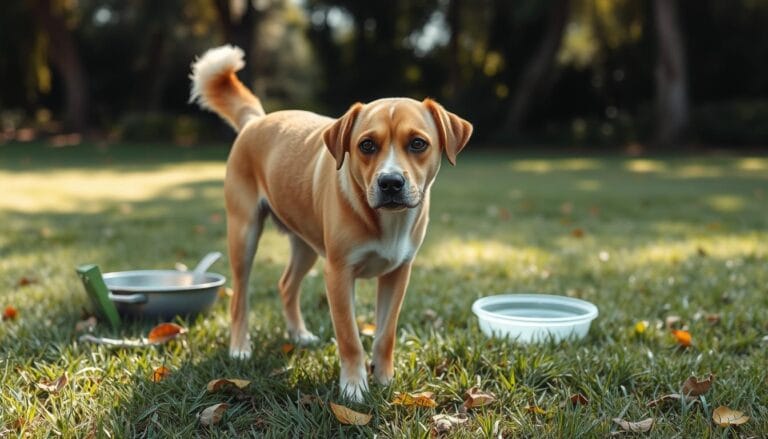Can Dogs Have Olives? Benefits and Risks Explained
As a dog owner, you might wonder if your pet can have olives. Olives are not toxic to dogs, but there are risks and benefits to consider. Can dogs eat olives? Yes, but with caution.
Olives have a lot of sodium, which can harm dogs with kidney or heart issues. Their pits can also be a choking hazard.
Table of Contents
Before giving your dog olives, it’s important to know about moderation and health benefits. Can dogs have olives as a regular snack? Probably not, as they lack nutritional value and are high in sodium. But, in small amounts, olives can offer monounsaturated fats, antioxidants, and other good nutrients.
Key Takeaways
- Olives are not toxic to dogs, but they should be given in moderation.
- Can dogs eat olives? Yes, but only pitted and plain olives are safe.
- Olives are high in sodium, which can be harmful to dogs with kidney or heart problems.
- Olives can provide health benefits, including monounsaturated fats and antioxidants.
- It’s essential to avoid giving your dog olives with added ingredients, such as garlic or chili.
- Can dogs have olives as a regular snack? No, due to their lack of nutritional value and high sodium content.
- Always choose plain, pitted olives to minimize the risk of choking or intestinal obstruction.
Understanding the Safety of Olives for Dogs
Thinking about adding olives to your dog’s diet? It’s key to know if they’re safe. The question are olives toxic to dogs gets asked a lot. The answer is no, they’re not toxic, but they can be risky.
Whether your dog should eat olives depends on a few things. This includes the type of olive, how much they eat, and their health needs.
So, can dogs eat olives? Yes, but with care. Olives aren’t a must for dogs, and they should be given in small amounts. Make sure to pick plain, unsalted olives to keep your dog’s diet balanced.

- Only give plain, unsalted olives
- Avoid giving olives that have been prepared with garlic or oil
- Don’t give your dog stuffed olives, as they can contain harmful ingredients
By knowing the safety of olives for dogs and taking the right steps, you can keep your dog healthy and happy. Always talk to a vet before changing your dog’s diet.
Can Dogs Have Olives? The Complete Answer
As a dog owner, you might wonder if can dogs have olives or can dogs eat olives as a treat. The answer is yes, but with some limits. Olives are safe for dogs to eat in small amounts, as they are not harmful. But, it’s important to think about the risks and benefits before giving olives to your dog.
Olives are full of good stuff like antioxidants, healthy fats, and vitamins. They can be a great addition to your dog’s diet. But, it’s key to introduce them slowly and in small amounts. Here are some important things to remember:
- Olives are low in calories, making them a good treat for dogs that need to keep their weight in check.
- They have fiber, which helps with digestion and prevents constipation in dogs.
- Monounsaturated fats in olives can help keep your dog’s skin and coat healthy and may lower heart disease risk.
When giving olives to your dog, it’s best to give them just one or two as an occasional treat. Eating too many olives can upset their stomach, causing vomiting and diarrhea. Also, make sure to remove the pits, as they can be a choking hazard.

To make sure your dog can enjoy olives safely, choose plain, high-quality olives without preservatives or additives. Opt for unsalted ones. By following these tips, you can decide if adding olives to your dog’s diet is right for them and enjoy the benefits they offer.
Nutritional Benefits of Olives for Dogs
When thinking about can dogs have green olives, we must look at the good stuff in olives. Olives are packed with nutrients like healthy fats, vitamins, and minerals.
Olives are full of fiber, vitamins A, E, K, B complex, and minerals like iron, calcium, and magnesium. They also have monounsaturated fats. These fats help keep a dog’s skin and coat healthy and lower heart disease risk.
- Antioxidant properties, which help reduce inflammation and support the immune system
- Healthy fats, which promote skin and coat health
- Mineral content benefits, including iron, calcium, and magnesium
In small amounts, olives can be good for a dog’s diet. They add important nutrients and help with overall health. But, it’s important to start slow and watch for any bad reactions. Too much sodium can be bad for dogs with certain health issues.
Different Types of Olives and Their Safety
Feeding olives to your dog requires knowing the different types and their safety. Are black olives safe for dogs? Yes, but only in small amounts. Black olives, common in stores, are not harmful to dogs. If your dog eats one or two, they should be okay.
Olives with pimentos are also safe, but in small amounts too. Can dogs eat olives with pimentos? Yes, but only in small amounts. Pimentos are safe for dogs in plain, unsalted olives. But, make sure the olives are pitted to avoid choking.
Here are some key points to consider when feeding olives to your dog:
- Only feed olives in moderation to avoid excessive sodium consumption
- Choose plain, unsalted olives to minimize the risk of salt toxicity
- Ensure the olives are pitted to prevent choking hazards
- Avoid feeding olives with harmful additives, such as garlic or blue cheese
In summary, while are black olives safe for dogs and can dogs eat olives with pimentos are important questions, the main thing is moderation. Choose plain, unsalted, pitted olives to keep your dog safe and healthy.
Are Black Olives Safe for Your Dog?
As a dog owner, you might wonder if black olives are good for your pet. Olives can be healthy, but there are risks to consider. The main worry is the high sodium in black olives, which can harm your dog. One black olive has 32 milligrams of sodium.
When thinking about are black olives safe for dogs, the answer is not straightforward. Black olives are not toxic, but the sodium can be a problem. Dogs with sensitive stomachs or high blood pressure should avoid them. Also, the fat in black olives can cause pancreatitis if eaten too much.
- Remove pits to avoid choking hazards
- Limit the amount to one or two olives as an occasional snack
- Monitor your dog’s sodium intake to avoid excessive consumption
- Consult with a veterinarian before introducing black olives into your dog’s diet, specially if your dog has pre-existing health issues
In conclusion, while can dogs eat black olives is a common question, it’s important to be careful. Knowing the risks and taking precautions can help keep your dog safe and healthy. Always put your dog’s health first and talk to a vet if you’re unsure about giving black olives or other human foods.
Green Olives and Their Effects on Dogs
As a dog owner, you might wonder can dogs have green olives and are green olives safe for dogs. The good news is that green olives are not toxic to dogs. But, there are some safety tips to remember. Always introduce green olives in small amounts to avoid risks.
Here are some key things to consider when feeding your dog green olives:
- Only feed your dog a few green olives at a time to avoid stomach issues
- Make sure to remove the pits, as they can pose a choking hazard
- Be aware of the high salt content in green olives, which can lead to dehydration and toxicity if eaten too much
Green olives are good for dogs because they have healthy fats and antioxidants. These can help your dog’s health. But, remember, green olives should not be the main part of your dog’s diet. Eating too many can cause stomach problems, vomiting, and diarrhea.
To make sure your dog can enjoy green olives safely, choose plain, pitted olives. Start with small amounts. If you’re unsure about feeding your dog green olives, talk to your vet for advice.
The Truth About Pimento-Stuffed Olives
Thinking about pimento-stuffed olives and your dog’s safety is key. Many dog owners ask, can dogs eat olives with pimentos? The answer is not straightforward. Olives can be a healthy snack for dogs, but pimento-stuffed ones might not be safe.
Some pimento-stuffed olives have ingredients that are bad for dogs, like garlic or blue cheese. So, it’s important to check the ingredients before giving them to your dog. Generally, it’s safer to avoid pimento-stuffed olives because of the risks.
Here are some important things to remember about pimento-stuffed olives and dog safety:
- Always check the ingredients for harmful substances like garlic or blue cheese.
- Choose plain, pitted olives without any extra flavorings.
- Limit the number of olives you give your dog, as they are high in sodium.
In conclusion, while olives can be good for dogs, pimento-stuffed ones need extra care. By being careful with ingredients and risks, you can make better choices for your dog.
Potential Risks and Side Effects
When thinking about are olives toxic to dogs, it’s key to know the risks. Olives aren’t toxic, but there are dangers to consider. The salt in olives, like in black olives, can be too much. Too much salt can harm dogs, causing vomiting, diarrhea, and feeling tired.
To keep your dog safe, it’s important to can dogs eat olives safely. Give them olives in small amounts and watch how they react. Some dogs might not like olives and could get sick. Also, olives have a lot of fat, which can be bad for dogs with pancreatitis.
There are other dangers too, like choking on olive pits and stomach problems from eating too many olives. To keep your dog healthy, take out the pits, give them olives slowly, and talk to a vet before changing their diet.
Salt Content Concerns
Olives have a lot of salt, which is bad for dogs, but worse for small breeds like Dachshunds. Watch how much you give your dog and be ready for health problems.
Choking Hazards
Olive pits can choke small dogs. Make sure to remove the pits or use pitted olives to keep your dog safe.
Digestive Issues
Eating too many olives can upset a dog’s stomach, leading to vomiting and diarrhea. Start with small amounts and watch for any bad reactions.
How to Safely Feed Olives to Your Dog
When thinking about can dogs have olives, remember to keep it in moderation. Olives can be a good treat for dogs, but they shouldn’t be a main part of their diet. To feed olives to dogs safely, start with small amounts and watch how they react.
Here are some tips for safely feeding olives to your dog:
- Only offer pitted olives to avoid choking hazards
- Choose olives that are low in sodium to minimize the risk of dehydration
- Start with a small serving size, such as one or two olives, and gradually increase as needed
- Consider using olive oil as a healthier alternative, but be aware of the high fat content and possible risk of pancreatitis
Every dog is unique, and some might have allergies or sensitivities to olives. Always talk to your vet before adding new foods or treats to your dog’s diet. By following these tips and being careful, you can give olives to your dog as an occasional treat.
When to Avoid Giving Your Dog Olives
As a dog owner, it’s key to know when to skip giving olives to your pet. Olives can be a good snack in small amounts. But, there are times when they might not be safe. If your dog has pancreatitis or needs to stay away from fatty foods, olives are not a good choice. They are too rich in fat, which can make pancreatitis worse.
Dogs with kidney or heart problems should also steer clear of olives. This is because olives have a lot of salt, which can cause dehydration. Always make sure to remove the pit from olives before giving them to your dog. Can dogs eat olives is a question many pet owners ask. But, the answer really depends on your dog’s health and needs.
Here are some times when you should not give your dog olives:
- If your dog has allergies or sensitivities to olives
- If your dog has kidney or heart issues
- If your dog has pancreatitis or other health issues that require a low-fat diet
In these cases, it’s wise to talk to your vet. They can tell you if olives are okay for your dog. Remember, when to avoid giving olives to dogs is just as important as knowing when it’s safe to give them as a treat.
Conclusion
Olives can be a safe treat for dogs in small amounts. But, it’s important to watch out for risks. Olives have good fats and antioxidants, but too much salt is bad for dogs.
Always talk to your vet before giving your dog olives or any new food. This is to keep your dog safe and healthy.
Start with tiny amounts of olives and watch how your dog reacts. Look out for signs of allergies or upset stomach. Avoid olives with garlic or too much salt.
Choose plain, pitted olives to avoid choking and too much salt. This is safer for your dog.
Deciding to give olives to your dog should be with your vet’s advice. This ensures your dog stays happy and healthy.
FAQ
Can dogs have olives?
Yes, dogs can have olives in small amounts. They offer some health benefits. But, it’s key to introduce them slowly and watch for any digestive issues.
Are olives toxic to dogs?
Olives are not toxic to dogs. But, too much salt and oil can cause problems.
Can dogs eat black olives?
Yes, black olives are safe for dogs in small amounts. But, watch for digestive issues and avoid too much salt.
Can dogs have green olives?
Green olives are okay for dogs in small amounts. But, they might be more acidic and salty, which can upset their stomach.
Are pimento-stuffed olives safe for dogs?
Pimento-stuffed olives are not the best choice for dogs. The extra ingredients and seasonings can be harmful. It’s best to avoid them.
What are the possible risks of feeding olives to dogs?
Feeding olives to dogs can lead to salt concerns, choking hazards, and stomach issues. Start with small amounts and watch for reactions.
How can I safely feed olives to my dog?
Feed olives to your dog in small amounts and start slow. Watch for any bad reactions. Always talk to your vet before adding new foods.
When should I avoid giving my dog olives?
Avoid giving olives to dogs with health issues or sensitivities. Also, if they’re on certain meds or you’re unsure about their tolerance. Always check with your vet first.
There are no reviews yet. Be the first one to write one.







